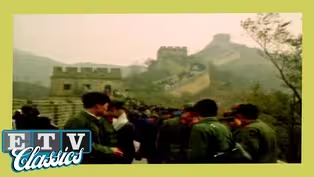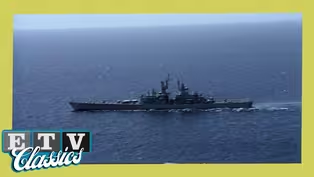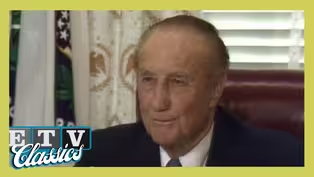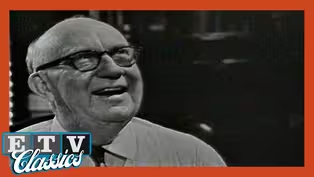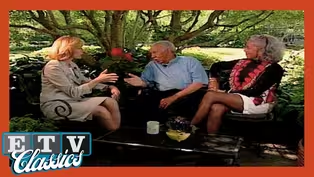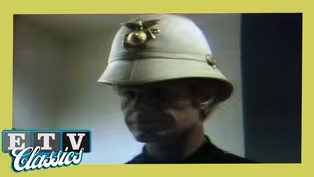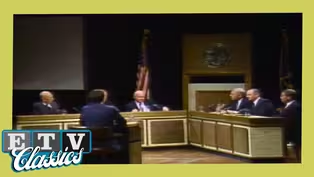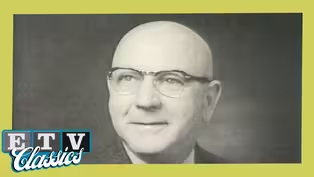ETV Classics
Remembering Bill Moyers: War in the Gulf - Town Meeting (1991)
Season 15 Episode 12 | 59m 32sVideo has Closed Captions
Bill Moyers, who died June 26, 2025, was an award-winning journalist and PBS host.
Bill Moyers, who died June 26, 2025, was a special assistant to President Lyndon Johnson before becoming an award-winning journalist and PBS host. The SCETV archives offer us an opportunity to share a SCETV classic and shine a light on a special moment with Bill Moyers.
Problems playing video? | Closed Captioning Feedback
Problems playing video? | Closed Captioning Feedback
ETV Classics is a local public television program presented by SCETV
Support for this program is provided by The ETV Endowment of South Carolina.
ETV Classics
Remembering Bill Moyers: War in the Gulf - Town Meeting (1991)
Season 15 Episode 12 | 59m 32sVideo has Closed Captions
Bill Moyers, who died June 26, 2025, was a special assistant to President Lyndon Johnson before becoming an award-winning journalist and PBS host. The SCETV archives offer us an opportunity to share a SCETV classic and shine a light on a special moment with Bill Moyers.
Problems playing video? | Closed Captioning Feedback
How to Watch ETV Classics
ETV Classics is available to stream on pbs.org and the free PBS App, available on iPhone, Apple TV, Android TV, Android smartphones, Amazon Fire TV, Amazon Fire Tablet, Roku, Samsung Smart TV, and Vizio.
Providing Support for PBS.org
Learn Moreabout PBS online sponsorshipMore from This Collection
Find classic news and public affairs programming from South Carolina ETV.
Open Line: Carolina to Shanxi (1980)
Video has Closed Captions
An exchange program for higher education between USC and the people of China's Shanxi Province. (28m 51s)
Charleston Place | Carolina Journal (1986)
Video has Closed Captions
This edition of "Carolina Journal" revisits the opening of the Charleston Place complex. (27m 20s)
U.S.S. South Carolina | Carolina Journal (1984)
Video has Closed Captions
Michael Collins goes aboard the missile cruiser U.S.S. South Carolina as it visits its namesake. (28m 54s)
Strom Thurmond Remembered (2003)
Video has Closed Captions
Charles Bierbauer reviews the life and accomplishments of South Carolina Senator Strom Thurmond. (1h 51m 22s)
Strom Thurmond At The Seat of Power (1982)
Video has Closed Captions
The documentary follows the life and career of Strom Thurmond. (29m 49s)
Profile: The Senator from Barnwell: Edgar A. Brown (1967)
Video has Closed Captions
A visit with the venerable Edgar A. Brown in his law office, home, and the streets of his hometown. (14m 42s)
A Conversation with Justice Ernest Finney, Jr.: A Lifetime of Success (2000)
Video has Closed Captions
The honorable Judge Ernest A. Finney, Jr. discusses his life, career, and legacy in SC's lawfare. (27m 47s)
Profile: Senator John Drummond of Ninety-Six | The Big Picture (2008)
Video has Closed Captions
The life and times of Senator John Drummond of Greenwood, South Carolina. (26m 53s)
Video has Closed Captions
The memoirs of three businessmen who attribute their successes to their time in the US Marine Corps. (28m 54s)
The Governors' Roundtable | Carolina Journal (1989)
Video has Closed Captions
A round-table discussion with nine men who served as governor of the state of South Carolina. (57m 54s)
Elie Wiesel | Solomon Tenenbaum Lectureship in Jewish Studies (2006)
Video has Closed Captions
Professor Elie Wiesel, first Nobel laureate delivers a lecture as a part of the Tenenbaum series. (1h 17m 18s)
Solomon Blatt: Speaker Emeritus of the SC House | Carolina Journal (1985)
Video has Closed Captions
The life and career of Solomon Blatt, Speaker Emeritus of the S.C. House of Representatives. (27m 49s)
Providing Support for PBS.org
Learn Moreabout PBS online sponsorshipCrew Member> Camera five goes up there.
Narrator> Wednesday evening on the Public Broadcasting Service's national schedule was a live town meeting from USC's Longstreet Theatre in Columbia.
For days leading up to Wednesday evening, crews from South Carolina ETV had been setting up for the program, hosted by noted journalist Bill Moyers.
The topic of discussion, education and at risk youth had been in the planning for a year, but by 7 p.m. it was evident that fate would play its part as a TV programmer.
(indiscernible chatter) The subject quickly changed to the crisis in the Gulf.
As it turned out, this town meeting would be the first and only such national forum of citizenry responding to the events in the Persian Gulf.
Events that were just then unfolding.
What follows is what the entire nation saw in Columbia, South Carolina, the evening of January 16th, 1991.
Bill Moyers> I'm here with 250 or so citizens of South Carolina and Columbia in particular.
South Carolina is one of nine southeastern states and forty percent of all the personnel in the Persian Gulf tonight are from these nine southeastern states.
So this is a part of America that has a very deep, direct link with the war that started three hours ago.
We've been listening to you down here and your colleague Jim Lehrer and your guests for the last three hours, and we're prepared now to just have an informal, give and take, a conversation of democracy at a moment of crisis and anxiety and peril.
I'd like to begin by asking those of you who are here in the Longstreet Theatre at South Carolina Educational Television.
I'd like to ask you, how many of you have, kin, tonight in the Persian Gulf?
Would you just hold your hand up?
Here, here, here, here, here, here, here.
How many of you have good, close friends in the Persian Gulf tonight?
Well, you can see that.
And you have some family over there.
Who are they?
Tell me your name.
Diana> My name is Diana Blackwell.
Bill> Who is over there?
Diana> My husband, Jeff Hanson, and my sister and brother-in-law, Ron and Marilyn Powell Bill> Have you talked to them today?
Diana> Yes.
I talked to Marilyn, fortunately, minutes after I heard that the air raid sirens had gone off into Iran, about 7:30 this evening when I was listening to the news.
When I heard that, I thought, I've lost them.
This is my sister and brother-in-law who are working for an oil company.
And...
I was getting ready to call my sister in Florence, South Carolina, when the phone rang and I could tell it, immediately was an international call.
And, it was Marilyn, she said she was in a shelter, that she was fine.
Everybody was looking out for everybody else, and she asked me to call her son, who was at the Naval Academy.
Bill> What about your husband?
Diana> Now, I spoke with him yesterday.
Bill> What's he over there for?
Diana> He's with the 169th Tactical Fighter Group with McEntire Air Base.
He's an intelligence analyst and fortunately, I've heard from him a good bit.
I've spoken to him three times on the phone and got a bunch of letters all in one day.
Bill> Why did he enlist?
Diana> Oh, God... (laughter) Bill> How long's he been in?
Diana> It's kind of a long story.
Bill> Briefly... Diana> I'll make it brief.
Okay, he was in the Marines for eight years, and he had been in the Air National Guard for a matter of weeks when he went over this time.
Bill> What is he fighting for?
Diana> He's fighting for a country he believes in very firmly.
He's... Bill> Is this your war?
Diana> It has to be.
Bill> What are you going to do tomorrow?
Diana> Go to work and continue to watch the news.
Pray.
Hope for everyone's sake that we can accomplish what the President wants to... if that's, the best way to bring the world back to order again.
Bill> Charles Roman, Minister.
You have relatives over there.
I saw you raise your hand.
Rev.
Roman> Yes, My son John is over there.
He's a sergeant in the chemical company.
And I have a son-in-law over with a trucking company.
Bill> Why did they enlist?
Rev.
Roman> My son enlisted because he always wanted to go in the Army.
I tried to talk him out of it, but he wanted to go in.
And so... he went in and made a career out of.
He's been in there 11 years.
And so he told me that, I asked him about going into combat, and he told me, "Somebody in war has to die."
So I never asked him another question about it.
That was his choice.
And I'm proud of him.
Bill> What do you think our interest is there?
What are they fighting for there tonight?
And they are fighting tonight.
Rev.
Roman> I don't know what they're fighting for.
It's not my war.
My son has to fight it.
But it's definitely not my war.
I feel betrayed, I felt as though my President was going to war in August.
I think that he orchestrated this whole thing up until now.
I think he made up his mind from the beginning that he was going to war, and I think he misled the American people into thinking that sanctions or some other thing was going to work, when he had already made up his mind that he was going to knock out Saddam Hussein's potential military power.
Bill> What are you going to do tomorrow?
Rev.
Roman> Tomorrow, I'm just going to pray and just hope for the best.
Bill> Senator John Courson, do you feel betrayed?
Sen. Courson> No, not at all.
I think the president made a very courageous decision.
Bill> You support him?
Sen. Courson> Absolutely.
Bill> If it's a long war, do you support him?
Sen. Courson> Oh, yes.
Yes, indeed.
I think sometimes one has to stand up to aggression.
And I think he's doing this and I respect him.
I was in a General Assembly the night we canceled the State of the State Address the governor was supposed to give.
The first time, I think, Nick, that's been done in our history.
And we have a very somber mood in our General Assembly, but I, I think that once the commitment is made and die is cast, we support the president.
Bill> During war... we're told that we all sacrifice.
And I want to ask all of you tonight, if this war continues, and I see some young men here and some young women, how many of you will volunteer to go?
Nobody?
There's one hand up there.
Why would you go?
Would you come down here a minute and let me ask you?
We'll get... you come on down.
But let me ask the rest of you while he's coming down.
How many of you will support a tax increase to pay for a war that we have to pay for one way or the other?
Can I see your hand?
That's about I'd say... Well, let's see the others.
How many of you do not support a tax increase to pay for the war?
I'd say that's about evenly divided.
Sir, would you tell me why you said you would volunteer?
Audience member> Well, sir, I believe in what the president is doing.
And if I'm called upon, I will support him.
Mainly because, I feel that... with all of the advice that he has received and with all of the other people who have advised him, he knows what he's doing.
And if I'm called upon, I will go.
Bill> You didn't raise your hand there when I asked you that question, sitting next to him.
What's your answer to that?
Would you go if the war continues?
Audience member #2> No, I would not go.
One because the, President has lied to us.
In July, when Iraq told the United States that they were going to go to war, we had no opinion about Arab to Arab conflicts.
From the onslaught, he has lied to us in the sense that he said that there has been, the nuclear threat.
Well, he never went and told us that America invited Iraq to a symposium a year and a half ago and to build triggers for nuclear warheads.
Bill> But we know are not... We are at war now.
What are you going to do?
Irrespective of the debate- Audience member #2> I'm a conscientious objector.
I don't have, as far as I'm concerned, morally it is wrong to go to war.
And I do not feel that any war is right, and I would not go especially to Middle East to go and fight a war, that I feel that we have absolutely no reason to be there.
Bill> Does anyone- Just one minute, sir.
Is there anyone who thinks the war is a just war?
A morally justified war.
We are at war now.
All right, Mr. Tenenbaum.
Sam> Well- Bill> What do you do in Columbia?
Sam> Put it on a theoretical level, if you and I were walking down the street here and a person were being raped, we have an obligation to come to their defense.
On this level, it's morally justifiable.
This is a, a thug who is going outside of his country to damage another country.
Now, we can't go into every country and cure every thug because there are a lot more- There are many thugs in this world.
Unfortunately, how we got there is of concern to me.
Where we are today though, I have to support the President, and I think it's morally justifiable.
Bill> Are you saying that we are helpless after a war begins?
Sam> Yes.
You have 400 some thousand Americans plus others there, they're in harm's way.
We have to make sure they're not harmed at this point.
Bill> Yes, ma'am.
Right over here.
Let us get a microphone there.
There we go.
Cece> I feel that if we're so concerned about people around the world who've been, who are being raped, and we need to go to their defense.
Then we should have been in South Africa a long time ago.
Because the Blacks in South Africa... (applause) I have a brother in Saudi Arabia.
God bless him.
God be with him.
Bill> Is he in the service?
Cece> He is in the service.
Bill> Why did he enlist?
Cece> He enlisted for the same reason that many Black Americans enlist.
It's about the only place in America that a Black male can get a fair shake.
Bill> But did he ever tell you that he thought he would be going to war- Cece> He and I do not necessary agree on this philosophically.
I want to say that I feel very, very outraged that this is now being called, as of tonight, a war to liberate Kuwait.
We cannot talk about the liberation of Kuwait until we talk about the liberation of many of the other Third World countries, which are actually First World countries- Bill> Would you be- that this country cares nothing about.
Bill> What is your name?
(applause) Cece> My name is Cece Byers Johnson.
Bill> Ms. Johnson, would you support the President sending your brother and other American troops to South Africa to overturn apartheid?
Cece> I am not in favor of that, but I am saying that for those who are continuing to say that this is a liberation movement and that this somehow takes precedence over all of those other people who have been oppressed in this world by the United States and the Soviet Union forever and a day, that they need to put their house in order, and they need to look at who is really being raped and by whom they are being raped.
Bill> Thank you very much, Ms. Johnson.
(applause) Ann Eisenstien, you are a counselor in a school system at Sumter, South Carolina, psychologist.
And you deal with a lot of young people whose parents are in the military.
Is that right?
Ann> That's correct.
Bill> What were they talking about today?
Ann> They were mostly holding their breath because we, we felt that something would happen in the next day or so.
The children have been talking about the conflict and the war for quite a few months.
Deployment started out of Shaw Air Force Base in August.
Bill> Which is right here.
Ann> Which is in Sumter.
And we have 15 schools in Sumter District Two, and many of them have Shaw Air Force Base children.
Some children have both parents deployed.
Bill> Their mothers and fathers- Ann> Mothers and fathers.
Bill> Are in the Persian Gulf?
Ann> Yes.
Bill> Who's taking care of them?
Ann> Grandparents have come in from other states... aunts, uncles, neighbors.
Bill> Do you think that's necessary, that in fighting a war and we are at war, that both parents are on the front lines?
Ann> I think that the decision that was made was probably a necessary one.
I, in defense of children needing a parent to care for them on a day to day basis, I personally find it hard that both parents would be sent.
Bill> I mean, I look around this room and I see obviously single young men and single young women.
Why shouldn't- I mean, should they be the first to go?
Because their, their commitments are fewer.
Ann> Should the single people be the first to go?
I can't make that decision.
I know that the students that I deal with, their parents have enlisted, in the military because that's something they believe in.
And in talking to the children, most of the children that I talk to believe that their parents enlisted because they wanted to defend freedom, and rights and citizens of other countries.
Bill> Talk to me a minute about the trauma of war as you see it, in the experiences of these children.
What are they saying to you about their anxieties and their concerns?
Ann> Well, Bill, we've been working with these children since the beginning of school.
We have, Saudi connection groups in many of the schools and the children who have parents deployed and brothers and sisters, in some cases deployed, have been meeting and talking to one another and talking to us for quite some time.
I spoke to several of them in a large group meeting, and I asked them those kinds of questions.
What was on their mind?
Much of the, the first response was fear.
They were afraid.
They were afraid of the unknown.
Many of them were afraid of nuclear war.
A lot of them were afraid that their mother, father will be killed.
And some of them are angry.
And even though they agree, that we do defend the right to freedom.
Some of them questioned "why my mom" or "why my dad."
Bill> There are some Air Force personnel are there not, here?
There are some military personnel from the nearby base.
Do any of you- would any of you like to talk about that, impact of war on your families or the families you know of?
Where, right here?
Here.
All right.
Go ahead, Tom.
Would you identify yourself?
Ruthena> My name is Ruthena Edwards, and my husband Leroy Edwards is in the, Saudi conflict.
I really didn't know about this until my way... Till we were on our way over here, and this is really knocked me for blow.
I left a son which is 15, home studying for exams tomorrow morning.
I would really like to see exams canceled for kids with, families in the Gulf because they need time to sit down, maybe with the guidance counselor tomorrow morning, you just finish talking and... get this all in a perspective.
They need to find out what's going on.
Bill> What are you telling- Ruthena> They need to be able to express themselves.
Bill> What are you telling your son about your, his father tonight?
Ruthena> Well, when I go home, I really don't know.
I guess I'll pray my way back to Florence and...
I...
I've been telling him all the time "Dad might not get back."
He has to realize that his dad, it's a possibility he might not come back.
Bill> Has he talked to you about that?
Have you talked to him?
Ruthena> No, my son... No, he's a introverted person.
He does not express himself.
But I do have a nine-year-old daughter.
And she asked me last night, she said, "Mama, what is war?"
And I was trying to tell her that war is a thing, that where as people, they have to fight, they fight in a war and people get killed.
And I was telling her that "Dad might not come back."
And matter of fact, last night was the first time she ever asked "What was war?"
I think it really hit home last night.
Bill> If he doesn't come back, what will he have died for?
Ruthena> He would have died for his country and he would have died for us to be free, all over the world as a, nation and...
I'm not saying he's dying for all, he's not dying for all.
He's dying for what he believes in.
Bill> And what is that?
Ruthena> Okay.
He believes that all men should be free all over the world.
Bill> All right.
How many of you communicated to your representatives before they voted on the war resolution last week?
How many of you communicated your opinion on them?
A few, do you feel that they listened to you?
Does anyone want to say, address that?
You don't.
This young man right here.
Let's take a microphone over there and, if you don't mind identifying yourself.
Kerry> Hi, my name is Kerry Abel.
I don't feel they listened because I think, they're not concerned about the people of this country.
When you look at the money we're spending over in Saudi Arabia, there's something wrong.
There's something terribly wrong, when we go to a foreign land, and spend that much money, when we have children right here in America that are starving, when we have people right around the corner from the White House who can't find decent housing, who can't eat.
There's something wrong with our priorities.
(applause) Bill> Let me, let me ask...
This lady said that she was from Florence.
And Richard Sale, here is from Florence.
You're the chaplain to the police department there, are you not?
Richard> That's correct.
And also, I'm serving sort of unofficially as a volunteer chaplain with 132nd MP Division from Florence that has been deployed to Saudi Arabia.
These are two from our unit over there.
And... who are wives.
One has a six-weeks-old baby whose husband has never seen that child.
And I'm working very closely with that.
Bill> Tell me about what you're coming to understand about their state of mind and their sense of things?
Richard> One of the reasons I'm late tonight is because I made phone calls to everyone I could, within the time frame.
As soon as I heard of the attack.
Their frame of mind in our prayer group last night of over 200, was "I'm scared, please pray.
I don't know what's going to happen."
And, the basic word I kept hearing is "I'm very, very scared."
And I think that's the general feeling of so many of the wives.
And I talked to a father last night, who was talking about his son.
19 years old, being on the front lines also.
And, they are in Saudi Arabia, and they're going through a lot of hurt.
And I think my sensitivity originated with nine police officers from our department, who also are on the front lines in Saudi Arabia.
And, I'm very, very concerned about our support that we give these families.
Bill> Why do you think they're there?
Your own personal opinion?
Richard> Well, I think they're there for the, the freedom of our country and for the defense of our freedom and, to preserve what we basically, hope our tradition of what we stand for.
Bill> Do you feel that the President, you personally feel that the president did the right thing?
Richard> Yes, sir.
I support the President's decision.
Bill> At what point might you change your mind?
Richard> I would have to see how the- I'm trying to look at the events as they unfold.
I've kept my ear very closely to the radio, driving over.
I don't know where I would change my mind.
At this point, I would just say I'm just listening to see where, if we are succeeding in what we hopefully our mission is.
Bill> Lieutenant Governor Nick Theodore.
Is there going to be a direction away from, the resources that the state of South Carolina has been spending and is spending on other services toward this war effort?
And if so, how will that play politically?
> Well, actually, I do feel that there would be a divergence of the funds that we utilize for other purposes.
And goodness knows, in South Carolina, we are always short of adequate funds for the many programs that are so necessary.
However, I think, from a political standpoint, while it would be damaging up front that the long range thought will be one that will basically support the effort, whatever it would require in the way of our resources.
Bill> What went through your mind tonight when you heard the news that we were at war?
Lt. Gov.
Theodore> I have, now three indelible dates in my mind.
On December the 7th, 1941, when Pearl Harbor struck.
And I was a very young, young lad in Greenville, South Carolina.
The date that I heard of the assassination of President Kennedy.
And now, today, when we struck, in the Middle East.
Those three dates were very significant.
We all hate war.
Franklin Roosevelt, of course, said it best, many years ago.
Tonight, as we were meeting for the joint session of the General Assembly to discuss matters of reform in government and reform of ethics, waste problems, economic problems, and of them that were concerning the people of our state.
Immediately when we heard of the and the television sets set up in the lobbies and throughout the State Capitol came on board with the the serious news about the bombings in, to the Iraq country.
We certainly, at that time saw a total change of atmosphere from one of excitement, enthusiasm about state problems to- that seem so major at the time, to the tremendous problem of our international crisis.
Bill> It won't be the first time that a foreign intervention distracted America, will it?
Lt. Gov.
Theodore> That's very true.
Bill> In your lifetime.
Ms. Eisenstien, Let's talk a moment about how well our service personnel are being treated.
Tell me about these families who are here.
How are they living?
Are they doing all right financially, are we taking care of them?
Ann> Well, I think in the beginning there were lots of problems.
and those people that are military connected, perhaps can speak better to this, but from what I've heard, they had things to work out, such as finances and just... different things that were not taken care of by the spouse that is still here.
They had to, a lot of things to get settled and the Air Force base has helped them do that.
There are support groups on base that have been forming.
So they're taking care of the families.
We're working in close connection with the school district and Shaw Air Force Base in making sure that families have all the support they need.
Bill> I'm told that there are some families out there who are living, who need food stamps, who get food stamps, living on welfare.
Ann> Yes, we do have some families like that.
We have some families that are single parent families also.
Bill> And what's happened to those?
Ann> Same as I said before, we've had to have neighbors or grandparents come in to, to take care of the children.
Bill> Let me ask that for a moment.
I mean, is that fair?
We're at war.
Is it fair that we're all sitting here tonight and there are single mothers of, little children who are off on the front line, single and fathers and mothers.
I mean, is that just?
What do you think?
Anybody want to address that?
Yes, ma'am.
Rhonda> Yes.
My name is Rhonda Dring and I'm from Florence, South Carolina.
My husband name is Lawrence Dring.
He is with the 132nd MP Company.
I'd like to say I'm very proud of him.
I support what the President says.
I was lucky enough to receive a phone call from him today.
The only thing he said, "Don't worry about me.
I'm going to be fine.
The Lord's going to be looking after me."
He was more concerned about me and our little daughter, Caroline.
Bill> She's how old?
Rhonda> Six weeks old.
Bill> How long has he been over there?
Rhonda> He's been gone, since September 12th- is when he was activated.
Bill> Why do you think he's over there?
Rhonda> He's over there for his country.
He's not over there for oil, I know that.
He's over there because Saddam, ...he needs to get out.
And like, in a matter of days, months, who knows when he's going to have capability.
I rather have my husband over there now than rather in a couple years, or who knows when to have my daughter over there fighting for the same thing.
Bill> How are you doing financially?
Rhonda> Financially, I'm doing fine.
Bill> You're getting along on what he sends home.
Rhonda> Yes, I am.
We're making it from paycheck to paycheck.
Bill> What are you going to do the next 24 hours?
Rhonda> I'm going to pray, and go home and hug my little girl.
And I'll talk to her.
I showed her videos of her father, pictures of her father.
And just recently, I've got a videotape.
He just seen his little girl for the first time.
And he was very happy.
And he was very, very... he said, "She looks like me.
And that's why she's so beautiful.
Is because she came from us."
Bill> Well, I'm sure she has a beautiful soul, if she grows up to reflect, your commitment and your loyalty to your husband and to your president.
Rhonda> I'm sure she will.
And I know that he'll be back and he'll see his little girl.
I just pray that it won't be in two years.
Bill> What are the rest of us sacrificing?
Yes, sir.
If you would identify yourself.
Marvin> My name is Marvin Byers, and I reside here in Columbia.
I'd like to make the statement that I believe this war is being fought for oil and oil only.
If we think that Saddam Hussein is someone that we need to fear as a nation, then we really have a problem.
We estimate that he would have nuclear weapons in one to three years, five years.
So what?
We sat in Europe for forty years, looking at Russia in a so-called "Cold War."
And every one of us, Russia and the United States has enough nuclear bombs right now to make Iraq look like nothing.
And if he gets one, so what?
We have Poseidon submarines in the Indian Ocean that can destroy half the world.
Why are we worried about one nuclear weapon?
That's primitive.
Bill> Would any of you like to respond to this gentleman?
Talk to him.
Right here, yes, sir.
Dan> Yeah, I wanted to say my name is Dan...
I'm a student here at USC.
And, I wanted to say that, also, along with the idea of building up armaments, Franklin Roosevelt also once said that, we... he said he couldn't help but to think that, U.S. as a nation was wiser because we didn't spend half of our national income building up armaments upon armaments for purposes of war.
And I think that, it's ridiculous to go to war for oil.
And it cannot be- Bill> We are at war.
We are at war.
What are you going to do about it now?
Are you going to support, the troops who are over there?
Dan> I definitely will support the troops that are over there.
I just do not agree with the position, and I...
I do not agree with paying taxes, for such a cause.
Bill> Are you going to pay your taxes?
Dan> Yeah.
I'm a taxpayer, and I don't believe in paying taxes for the cause.
Because when you have joblessness and homelessness and lack of education and of course, lack of energy research in this country, then I think there are problems at home that definitely need to be fixed.
Bill> There's a young lady with her hand up to your right there, up to your right.
Audience member #3> I just wanted to elaborate on the scenario of being a rape.
Well, if we are going out there and helping this country, that's being raped.
How many people are raped in America?
How many people are being suppressed in America by not having homes or jobs and Kuwait asked for our help.
How many people ask the American government every day in America for the government's help?
(applause) Bill> All right, let me ask you a question.
Audience member #3> We go over to another nation- Bill> We are at war.
Audience member #3> We are at war right now.
Bill> So what should people like you do who disagree with this?
What do you intend to do?
Audience member #3> I intend to keep saying that I don't believe in it.
I don't think it's right.
I don't think that we should put all our resources and our men who are also being raped by this war, by being killed, you know, in a sense.
All of our human resources are going over there, and I want them home.
That's how I'm going to support my troops by wanting them home.
Bill> I'd like to hear somebody who would like to talk to her.
Audience member #3> -As soon as possible and safe.
Bill> Would you like to talk to her?
All right, let's have the microphone there.
Your name?
Jack> My name is Jack Brooks, and I... work locally.
A theme has come up a couple of times.
And some of the people, this young lady and somewhat the fellow before him and also the fellow over there regarding, saying that the reason we shouldn't be standing behind the situation is because it's being fought over oil, and we see that.
I've seen that all over the news.
You know, people marching around, they have banners, they scream, "No blood for oil."
That's the latest thing.
And then they sing "Give Peace a Chance," or something like that.
And yet... aren't there times- Well, let me just... How can I put this?
Bill> Why do you think we're there?
Jack> I think we're there to fight for oil.
You think we are?
(laughter) I thought you weren't- Jack> You see, people weren't following it.
They thought I was going to come from a certain direction.
I think we're there to fight for oil, among other things.
And I think there are times when you have to fight over things.
It's very easy to march around and say, "no blood for oil, no blood for oil," until the economy of the Western world is disrupted by an evil man who takes control of two-thirds of the energy resources of the world.
What are we going to do?
We say, "no blood for oil" and let things go on, and just imagine some little old lady in Chicago freezing to death in an unheated house as we sit- Everything we have, this entire facility is powered by the energy that's based in oil.
I agree we don't have an oil policy in this country to speak anything of- Bill> If I hear you correctly, you're saying that the war is justified because it ultimately is, to keep our industrial machine going and our way of life going.
Jack> Ultimately, it's for practical control of about half of the planet.
Bill> What do you think about this?
Young lady with the blue, dress there?
Tina> If they would have spent the money- Do you want me to identify myself?
I'm Tina McCree, from Columbia.
If they would have spent the money, overall that they've spent in a week keeping our troops in Saudi Arabia on researching alternative energy sources, we would not be in this situation today.
Bill> All right.
But you know that- (applause) I do understand your point.
I do understand your point.
But we are there, now.
America is there at this very moment.
Tina> I feel like we haven't been given any concrete reason as to why we are there.
I don't believe it's for oil.
Bill> What are you going to do about your feelings of opposition to the war?
Tina> I am saying a lot of prayers.
I'm involved with a very good church, here in town, who's, into sending positive energy to both the leaders and, the troops who are in Saudi Arabia- Bill> Do you think they've received that, energy?
Tina> Positive energy?
It's obvious that George Bush has not received it, (audience laughter and applause) or he would not have, bombed Baghdad tonight.
I wonder if he's even in touch with the American people enough to know how many people don't want this war.
Bill> Let me take a question on the issue of oil, because the Wall Street Journal reported today that a lengthy war and no one knows how long this war is going to last would hurt our economy.
That the price of oil, the Wall Street Journal said, would skyrocket.
Is it worth it, in your judgment?
Jack> Is the war worth it considering the price?
Yes, because I don't want to see, two-thirds of, our planet's energy resources controlled by someone like Saddam Hussein.
It's...
I'm not saying that this, that our country has an intelligent oil policy.
I also consider Saddam Hussein to be a Frankenstein that we helped create.
We sold arms to him for years.
You know, we turned the other way as long as he was murdering and blowing up Iranians.
You know, we thought that was fine.
Bill> So is this a good war, in your judgment?
Jack> I think it's a necessary war.
I don't know if there's any such thing as a good war.
Bill> Will some good come of it, in your judgment?
Jack> I think so.
Bill> What?
Jack> The maintenance of- Well, for one thing, the prevention of Saddam Hussein, from gaining a lever by which he can disrupt the economies of the entire Third World.
We had a fellow citizen talking about the needs of the, Black populations in South Africa earlier, but the whole Third World is being disrupted by the disruption of oil.
Bill> I'd like to know if there's anyone here who thinks that we should, the United States, go into Lithuania right now to prevent the Soviets from reestablishing, control over Lithuania?
Is there someone who would say yes to that?
Would you, sir?
Lewis> I'm not going to say yes- Bill> Oh, you're evading the question.
Lewis> My answer to that- Bill> Hold it, let's get the microphone.
Your name, sir.
Lewis> Lewis Fleming of Sumter.
My answer to that is, if our leaders hope to lend credence to us rushing to the liberation of the Kuwaitis, then they must rush everywhere.
Everywhere, and especially... (applause) And especially to Russia, and especially to Russia.
Who's the other big two.
You know, America, Russia and China.
But I don't put any credence in the fact that we're in the spot that we're in, because we want to liberate Kuwaitis or we want to liberate anybody for that matter.
It's a sordid, it's a sordid morbid cynical situation that we find ourselves in.
Bill> Would, would anyone here volunteer in a war to relieve Lithuania of the distress imposed on it by the Soviet Union?
Would any of you?
You're shaking your head "No."
I don't see anybody shaking their head "Yes."
We're here in South Carolina with, some 250 or 300 citizens of Columbia and the state.
We had come together today for a town meeting on education.
We're now talking about war.
And I'd like to ask the mayor of Columbia, Mayor Coble, to what extent do you think the war that is going on right now is going to disrupt, the services and resources that you have available for running this city?
> I don't think, that the resources that are going in this war, would have come to the aid of local communities.
The federal government has cut back on many of the programs that, federal revenue sharing and whatever.
So I don't know that that would have an impact.
And we'll make do on what we have.
The best way we can.
I mean, to me, the issue is everyone would probably agree that what Saddam has done was wrong, was not the right thing, attacking and invading another country.
The issue is, who's going to do something about it?
400 thousand Americans and the next largest group are 30 thousand British.
Should we bear that burden?
And secondly, what do you do?
Should you wait on sanctions or invade?
I think at this point the President, whether we agree with him 100 percent or 50 percent has made a decision.
And I think we have to support that decision.
Now, this is a democracy, and everyone can have a different opinion.
We've seen in wars gone by that people can dissent and have different views.
But for me, I think, this is a time when Americans have to come together to support, a decision because you can look behind and second guess, this, should we- where and when should we use our force?
Why should we use our force?
Bill> What is the moral obligation of people in a time of war when the nation is already at war?
I mean, what is the the moral obligation of people who do not agree that that is a just war.
Mayor Coble> In a democracy, I think they have the right and, to pro... to dissent, to speak out.
Bill> What forms of dissent do you think would be acceptable here in Columbia?
Mayor Coble> I think this forum here tonight is one where people can express their views.
Bill> But what if these... young people over here acting out of their strong conscience, blocked the entrance to Shaw Air Force Base tomorrow?
Would you consider that legitimate dissent?
Mayor Coble> I think any type of peaceful dissent is legitimate.
Obviously... you couldn't allow an Air Force Base to be blocked.
But you have the right to, peacefully protest.
Bill> What I hear people saying is, a lot of people, "We don't like this war.
We disagree with it.
We think the President was wrong."
But there really is nothing that we can do as citizens.
Once we are at war, we must rally around the troops.
Even though we believe intellectually and morally that the war is wrong.
Mayor Coble> You know, if you look back over history though, as a practical matter, when a war is not adequately explained to the public and the public support for that effort, wanes, just as it did in Vietnam.
You... it's hard to, for the President and for Congress to maintain it.
I think the burden is on President Bush to clearly explain again and again why we're there and to conduct the war in a very precise manner and as quickly as possible.
However I think the issue is not whether it's a just cause.
The issue is, are we the ones that should have done something about it?
Or should we have let sanctions run further?
You know, that decision has been made.
And, you know, I for one, believe that, you know, the time for second guessing is over.
And, that decision, I wouldn't have been 100 percent for what he did, necessarily.
But now that it's been made, I think we have to, rally around that.
Bill> So in a presidential war, we're helpless?
Mayor Coble> Well, no, I mean, the citizens can- This is one this is what I would say now other citizens, as clearly shown here tonight with citizens from all over South Carolina can express differing views.
Those views are being as, in a democracy, are being telecast all across the nation tonight, of what people, as you said, this is the only town meeting this occurred in America since the war started.
And, Americans can see what other folks think.
And public opinion, I think, ultimately dictates public policy.
Mr.. John Massey, graduate student, University of South Carolina.
What do you think, do you think the President made the right decision?
John> Well, no, I don't agree that he made the right decision.
Bill> Are you going to do anything differently because of that?
John> Well, I don't know.
I'm going to continue to voice my protest, against the decision.
<How?> To continue to urge... the withdrawal of troops.
I think one of the things that I've heard that we've touched on, are economic sanctions.
I think that among the college students, everyone would agree that Hussein does need to leave Kuwait.
The question, that I think is creating some of the differences is how we want to get him out.
In a teach-in last night, at the university, a good point was raised is that economic sanctions are a form of war.
It's a form of waging economic war.
And it depends on what you consider is a premium.
In economic sanctions, the premium is time.
It takes time for those to work.
In a war, with military action, it's human life.
And it sounds like the decision that we've made is that... human life is not as important as our time.
Bill> Is anyone- Are you going to do anything differently tomorrow because war started tonight.
John> Well, tomorrow I won't be able to.
I'm a student, and the classes here at the university are continuing.
I've paid them a great deal of money.
(laughter) Bill> Is this issue- Right?
Is anybody... is anyone in this room going to do something differently tomorrow because this war started?
Yes, sir.
Right over here.
Your name is?
Warren> My name is Warren Dickey, Student Government Association President of South Carolina State College.
And we have many students who are overseas and I think the thing that we need to do now is to start preparing ourself, ourselves for counseling and just to, minimize the impact when the soldiers return.
And I think we need to now have more support groups for the families of the students and the fellow people who are overseas.
Bill> What did you say?
What is your name?
Warren> My name is Warren Dickey, Student Government Association President.
Bill> If the war continues longer than people hope, will you volunteer?
Warren> I would not volunteer, but if I was drafted, I would go and fight because that's the... just something I believe in.
But I don't believe in, I don't believe it's necessary for me to volunteer at this present moment.
I think we have enough soldiers in the reserves and National Guard at this moment.
Bill> If the president asked for volunteers, would you?
<No.> How about the young man sitting next to you?
Christopher> My name is Christopher Brown, and I'm the business manager for the Student Government Association.
I don't feel that it would be necessary to volunteer, but I think we're focusing, more on some of the, precursors to the war instead of what the actual reality of it is.
It's a proven fact, with all respect to the Republican Party heads, that when we go into a recessionary trend, America has a tendency to look towards military action as a way of reversing that effect on the economy.
And what President Bush has planned, (applause) what President Bush, along with his other chief helpers have planned, is a way to boost the economy of the upper class.
Hughes Aircraft... (applause) Bill> To make it... to make it a more just war in your judgment, should the President initiate the draft so that the sons and daughters of the wealthy, go along with the sons and daughters of the poor?
Christopher> I am a Christian, but I would say, in the words of Minister Louis Farrakhan, "Send your son, Mr.
Bush."
(applause) Bill> What about the question of what we really know?
You heard Robin say a minute ago, almost everything we know is coming out of reporters who are in the Persian Gulf, except for what the government is telling us.
Do you believe, Mr. Clyburn, is it?
<Yes.> Mr. Clyburn, do you believe that the government and you're in government, your position is what?
Mr. Clyburn> I'm Human Affairs Commissioner for the state of South Carolina.
Bill> I don't put you on the spot then as a public official.
Do you believe the government in Washington is telling us the truth about what's happening over there tonight?
Mr. Clyburn> Well, we are not getting our information from the government tonight.
I think that the journalists I have been watching, since the invasion, and I think that we have been getting, pretty good on the spot reports from the journalists.
Bill> Do you think that... the press, the government should put restrictions on the reporters who are over there?
Mr. Clyburn> No, I don't think so at all.
I believe in a free press.
I believe in the First Amendment.
I believe in the Fourth Estate.
And I think they're doing a pretty good job.
Bill> If you knew that government, that journalistic reports were, somehow enhancing Saddam Hussein's resolve or giving him a sense of, of concern at home, that we were divided at home.
Would you say that restrictions should be imposed?
Mr. Clyburn> No, I don't at all.
I don't believe anything that's happened tonight, could in any way rival, the open discussions that we've had going into this entire episode.
And I think that the media, has reported it, pretty thoroughly.
And if he, did not get, any kind of support for his cause, from the discussions we had for the last ten days, he certainly won't get it from what I've heard tonight.
I just don't think that- Bill> We're still at war.
Mr. Clyburn> We are still at war.
And I believe, like the last, young man over there believes.
Once we, the die is cast, I think that the moral discussions over how we got there and why we're there- we'll do well to suspend those discussions until after this, crisis is over.
Bill> For how long?
Mr. Clyburn> Until our men and women return safely back home.
I think it's a morale question as it is now.
And I do not believe, that we ought to, run the risk of dividing those men and women on the battlefield by having open discussions over things that cannot do anything but divide, the, the resolve of those people who find themselves in hostile situations tonight.
Bill> There is someone here, my South Carolina friends tell me, has a direct link over there.
Connie Ingram.
Ms. Ingram, you have relatives over there, don't you?
Yeah, I'm speaking to you.
Audience member #4> No, I'm not Connie Ingram.
No, I have a nephew over there.
And not to take away from South Carolina, but I'm from Louisville, Kentucky.
And I came down here for your show.
But I do have to agree with the gentleman that just spoke, that I think that we need to focus all of our attention on helping to build the morale of the boys that are over there.
I listened to the two ladies to my left speak, a few moments ago, and I admire them.
There is no negative thoughts in their speech, and they're supporting their husband.
And I think as American citizens, we need to support the President of the United States.
And we need to support the boys overseas.
Bill> So you think these young people who are here with their banner should keep it unfurled- Keep it furled?
Audience member #4> Pardon?
Bill> They should keep their banner out of sight and suppress their opposition to the war until the troops come home.
Audience member #4> I think everyone has the freedom of speech, but I think we need to focus that energy on supporting our boys that are at war, now.
Bill> You want to say something about that?
Yes, anyone of you there who has not spoken, so far, there are several of you who are eager to talk.
Pardon me.
Sure you can show the banner, this is an open forum.
Audience member #5> I wanted to address the lady who just said that she didn't think that we should be showing open opposition because, the troops need our support.
The reason we're showing our opposition is because we do support those troops.
We care about all the lives that are down there.
We... do not, I do not believe and I don't think anybody standing here believes that any of those men down there who are fighting for their country and who are fighting because they have been called are doing anything but their job.
It's their duty, they're down there doing what they know they should be doing.
They knew that when they signed up for their job.
That's not their fault, they didn't ask to go there- Bill> Commissioner Clyburn says this is likely to have a negative effect on their morale.
Your speaking up in dissent.
Audience member #5> I feel that a lot of the men down there- we have to question the cause of a war when, the people who are fighting it don't even seem to know exactly what they're fighting for.
Bill> I'd like to see your banner, and then I'd like to have any of you who support the President, who believe that this dissent is, is harmful, respond to these young people.
There's your banner.
South Carolina, South Carolinians opposed to war.
Why war?
And you, sir, what would you say to these young people?
Jerry> I'm Jerry Gudgel I heard this in the '60s, in the '70s.
I served, in that one, and listened to single threaded, groups.
We're a multifaceted nation.
But, as much as I disagree with Senator Hollings about his position, about the conflict itself, he did recognize that once it begins, we've got to stand together.
What many people don't understand is when you are in conflict, morale kills.
Low morale kills.
In the last conflict, the morale that was dampened by the divisiveness in the United States killed people.
And what you think you're trying to save, you are not.
Bill> This young man coming down here has a- (applause) Would you, respond to him or exchange with him?
Audience member #6> Well, I have another thing that I've been thinking about.
I'm a graduate student here in business, and, in business, we learn that every situation is a situation of risk versus return.
And I think a lot of times tonight we've talked about the risk, that are very real.
But I understand that some of the returns are very unreal.
We hear about the liberation of Kuwait.
President Bush tonight talked about this new world order.
And I'm wondering, in two weeks or two months or two years down the line when this conflict is over and we've lost thousands of lives, is that going to be worth the return of a liberated Kuwait or a new world order?
I mean, these are very untangible.
Bill> What do you think about that?
The microphone's still there.
Jerry> It's... we're all trying to look at a crystal ball to see which is the less of two evils.
Whether the conflict will bring a new order or if we did not intercede, whether it eventually would create a new order.
Again, it's a democracy.
We elect our representatives.
We elect the president.
He is all of our president, or he's all of our president.
I need an English person to correct that one.
But... there's got to be one person calling the shots, and he's got all the resources that he can muster throughout the country.
And when the decision is made again, we fall in line for the welfare of the troops.
Bill> Brenda Wentworth is a visitor here tonight from Maine.
She came down to be a part of our now, moot educational town meeting.
Ms. Wentworth, what would you like to say?
Brenda> Well first of all, I'd like to say there's no moot education going on here it's very educational for people who are watching.
I wonder why, nobody has addressed the very real possibility of this turning into a holy war if Israel... Israel is attacked and the possibility of the weapons that we hold and those of their countries and the possibility of annihilation.
We aren't talking, you know, we're talking about a conflict, but this is a war, a very, possibly powerful and devastating war.
And, that's very terrifying.
And so when I hear people talking about conflict, I get a little nervous- Bill> If Israel should be attacked, how many of you favor using American troops, in retaliation for that attack?
How many of you would favor using American troops?
One, two, three, four, maybe twenty or thirty.
Do you think to make this war more just, Ms. Wentworth, we should have a draft?
Brenda> No, I do not.
And I don't know that this war could be just.
That isn't the point that I was trying to make.
The point that I was trying to make is that if, if Israel's attacked, this becomes a holy war.
We don't have, an option of fighting with Israel because it makes sense that the, Arabian coalition, will be forced to fight against us.
Bill> You work with children, don't you?
<I do.> I would like to have, my colleagues in the control room play a spot that has been running today on PBS.
Cut yesterday by Mr. Rogers.
It deals with children.
And then I'd like to have both you and Ms. Eisenstien, respond to this spot.
Can you do that for us?
All right.
Good.
Here's the spot that Mr. Rogers cut yesterday.
♪ King> You may begin, Daniel.
Daniel> Hello, my name is Daniel Striped Tiger.
And I don't know why the people in reality have to have a war.
King> I King Friday the 13th, know why.
It's because the people in reality have always had wars.
And that's the way it has to be.
There, that should do it.
End of announcement.
Daniel> But King Friday, what about the children of the world?
King> They're not making the war.
Daniel> But war time can be scary time for children.
King> Very well.
I shall make a rule.
All children shall be well taken care of.
That should do it.
Daniel> Just one more thing, please.
If anybody is scared, I'd like you to know that you'll always have somebody to love you, no matter where you are.
Bill> Ms. Eisenstien, what do you think when you watch that spot?
And with it, in regard to the children you work with?
Ann> I think it's very important.
It's a very important announcement that can come to our children.
It's certainly what we've been trying to do in our school district.
Our major concern for our children is that they feel safe.
They feel comfortable.
They feel that they've got adults there who are going to look after them, take care of them, not leave them.
We're trying to be very sensitive to their feelings, discussing this openly and honestly.
We're not making promises we can't keep it.
As the gentleman said earlier, we have no crystal ball.
We can't make those kinds of predictions for them.
But I think that... spots like the one that we just saw from Mr. Rogers are very important, because they are afraid that they're going to be alone.
Any time we have a family change, any time a family unit undergoes some kind of separation or change, our children are traumatized.
And what we try to do is ensure that that trauma is taken care of.
Bill> On the question of dependence, Reverend Jeff Aiken of the First Baptist Church in Sumter, has a word.
Rev.
Aiken> That's First Presbyterian Church in Sumter.
We... Baptists are good folks.
And I know you're a Baptist, Bill, but we are Presbyterian.
We have, quite a few dependents from Shaw Air Force Base in our congregation.
And I think that, at a time such as this, we really need to give the dependents of military personnel our support.
We, have an opportunity really to, speak to the- Bill> Rev.
Aiken, would you stand up?
Yes.
Now, there you are.
We can see you.
Rev.
Aiken> We have an opportunity really to, give the dependents our support, regardless of, our opinions on the war.
I know that there are a lot of opinions pro and con in this room.
And, of course, there were in Congress.
I think one of the very important things was the way in which Congress debated this issue.
There were so many good congressmen and women on both sides of the issue.
But, when the issue was decided, most of them decided to, pull in and support the President.
And I think those of us who are close to the dependents of military personnel, regardless of how we feel about the situation, we should, give them the opportunity to let them know that we care about them.
This is a very anxious and trying time.
I think we've seen that from some of the dependents in this room this evening.
And I think as a nation, this is one of the best things that we can do.
We are doing this in our congregation.
We have a support group for the, dependents of military personnel.
And, they are getting a lot from this.
And within all of our spheres of influence, I think we can do this.
Bill> We're almost out of time, but I'd like to ask just two or three people quickly.
Reverend Charles Roman, how do you think the war that's going on right now is going to change America?
Rev.
Roman> I think the war is going to change America.
I think more people are going to get involved.
I think they're going to pay more attention to what their government's doing.
And I think if anything, if that comes out of this war, I think that's going to be great.
But I think that just following a leader, because he's the leader, that's the same thing they do in Iraq.
We fault the people in Iraq, for not talking against their government.
And then when folks over here talk about bad planning and blunders, we say we ought to follow the troops and not say anything.
I don't understand that.
(applause) Bill> Senator Courson, how do you think the war is going to change this country?
Sen. Courson> Bill, I think all wars are fought for economic reasons.
Bill> You think this war is for economic reasons?
Sen. Courson> Absolutely.
I don't think there's a question about that.
I think as far as the country, I think if it's a successful war and not a protracted conflict that will eradicate the Vietnam syndrome, that we've been operating under for the last 15 years.
Bill> How do you think it's going to affect us?
Sam> Well I think that, I agree with many of the statements of the students in terms of the failure of our institutions.
I think the Congress of the United States let us down.
The debate should have taken place in September when they voted last week, Bill> It didn't though.
Sam> I know it didn't.
And we have to make sure that this institution works.
One of the things we have to do is, is get more involved, many of us are involved, but many people are not involved.
And therefore we were left out and the institutions don't work.
Bill> There's a young person right here who wants to say something.
We're almost out of time.
Do you think the war is going to change our country?
Audience member #7> No, I don't, and it scares me because it seems that the only thing we learned from the Vietnam struggle was that you need to market war better.
Not to avoid it.
(applause) Bill> We have about thirty seconds.
Yes, ma'am.
Right here.
My name is Kim... and I'm gonna say, first of all, I have a wonderful nephew, a cousin over there.
Steven Gardner.
I don't believe in this war.
I have a five-year-old son who asked me "what war was," and I tried to explain it to him, and he asked me "why we're doing it," and I couldn't tell him.
And I'm here to tell you, in 20 years, if we go to war again, I'm going to shoot the boy in the foot before he goes over there and dies for some politicians- Bill> But we are at war.
It's not a matter of war again.
We are at war now.
Are you going to do anything differently tomorrow?
Kim> On the question of that, the one thing I believe that came out of the Vietnam War, that politics are made by opinion.
And I'm here to say that I will demonstrate my opinion every which way I can, to my officials in the State House and in Washington.
Listen...
I don't want it.
I don't want my cousin coming back in a box for oil.
(applause) Bill> On that note, we'll bring to a conclusion and tentative conclusion as the war itself is tentative, now.
This, town meeting here live in Longstreet Theatre at South Carolina Educational Television.
I want to thank those of you who are here at the main table, and those of you who are guests for coming tonight and sharing this with us.
Thank you very much.
Support for PBS provided by:
ETV Classics is a local public television program presented by SCETV
Support for this program is provided by The ETV Endowment of South Carolina.
